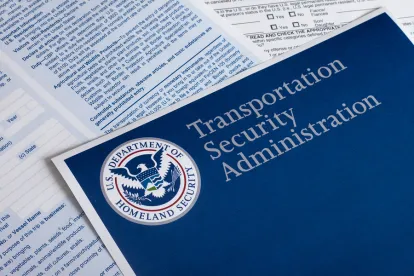On August 26, 2019, the Transportation Security Administration (TSA) enacted its new Action Plan Program. The Action Plan Program "provides an opportunity for eligible parties and TSA to discuss and reach an agreement on corrective actions to address the root cause of any security vulnerability or noncompliance with TSA's security requirements" and "resolve that vulnerability or noncompliance with administrative action instead of a civil enforcement action."
The TSA's Action Plan Program is modeled after the Compliance Program implemented by the Federal Aviation Administration in 2015. In essence, if there is a violation of a TSA rule or regulation or a security vulnerability, the Action Plan Program focuses on addressing the "root cause" of the violation or vulnerability so that further violations and vulnerabilities are eliminated. While the TSA retains its usual enforcement tools such as counseling, administrative actions, legal enforcement actions and the like, the Action Plan Program is a sea change in the TSA's enforcement protocol for addressing violations of its rules and regulations or security vulnerabilities.
By way of a police department and traffic cop analogy, instead of a traffic ticket (enforcement action), the Action Plan Program resolves unintentional and non-egregious violations and security vulnerabilities with administrative actions (in effect, a warning), not an enforcement action or civil monetary penalty. Takeaway: Fix the problem or security vulnerability, and the TSA will handle the matter administratively with an action plan letter that instructs the participating party on how to address the root cause of the violation or vulnerability through various corrective actions. If the participant completes all corrective actions, the TSA may issue a letter of correction, ending the matter. Importantly, the letter of correction "is not part of an eligible party's violation history."
The Action Plan Program applies to several transportation security regulations and relevant security programs, including cargo screening facilities (49 C.F.R. pt. 1549), aircraft operators (49 C.F.R. pt. 1544), flight schools (49 C.F.R. pt. 1552), and others. Given the FAA Compliance Program's success at diverting violators into its Compliance Program and away from civil enforcement actions, the Action Plan Program will likely become an important tool for eligible parties to avoid TSA enforcement actions including the imposition of civil monetary penalties. But the Action Plan Program does not apply to "egregious, flagrant, continuous, wanton, bad-faith, extraordinary, or conspicuously bad or glaring deviations" or "deliberate or intentional deviations" from the TSA's regulatory requirements, including those involving criminal activity or fraud.
The linchpin, however, to the TSA's Action Plan Program is voluntary disclosure by an eligible party, and that's always the rub in self-disclosure programs: "TSA encourages eligible parties to discover their own instances of noncompliance and take prompt and effective corrective action to ensure that the same or similar noncompliance does not reoccur." In short, self-disclose and fix the problem, and the Action Plan Program is available to mitigate and avoid typical TSA sanctions, including civil monetary penalties.




 />i
/>i

